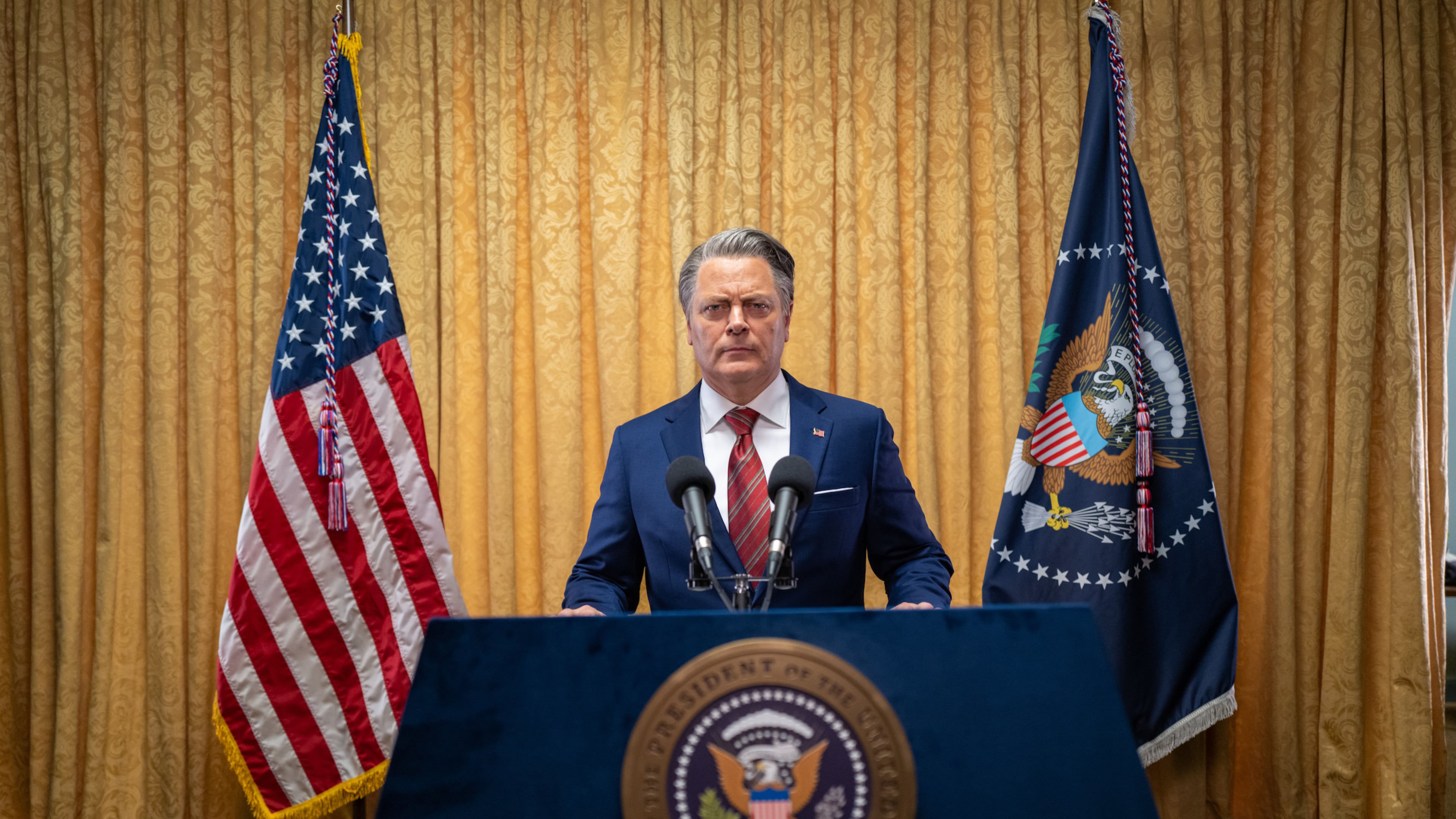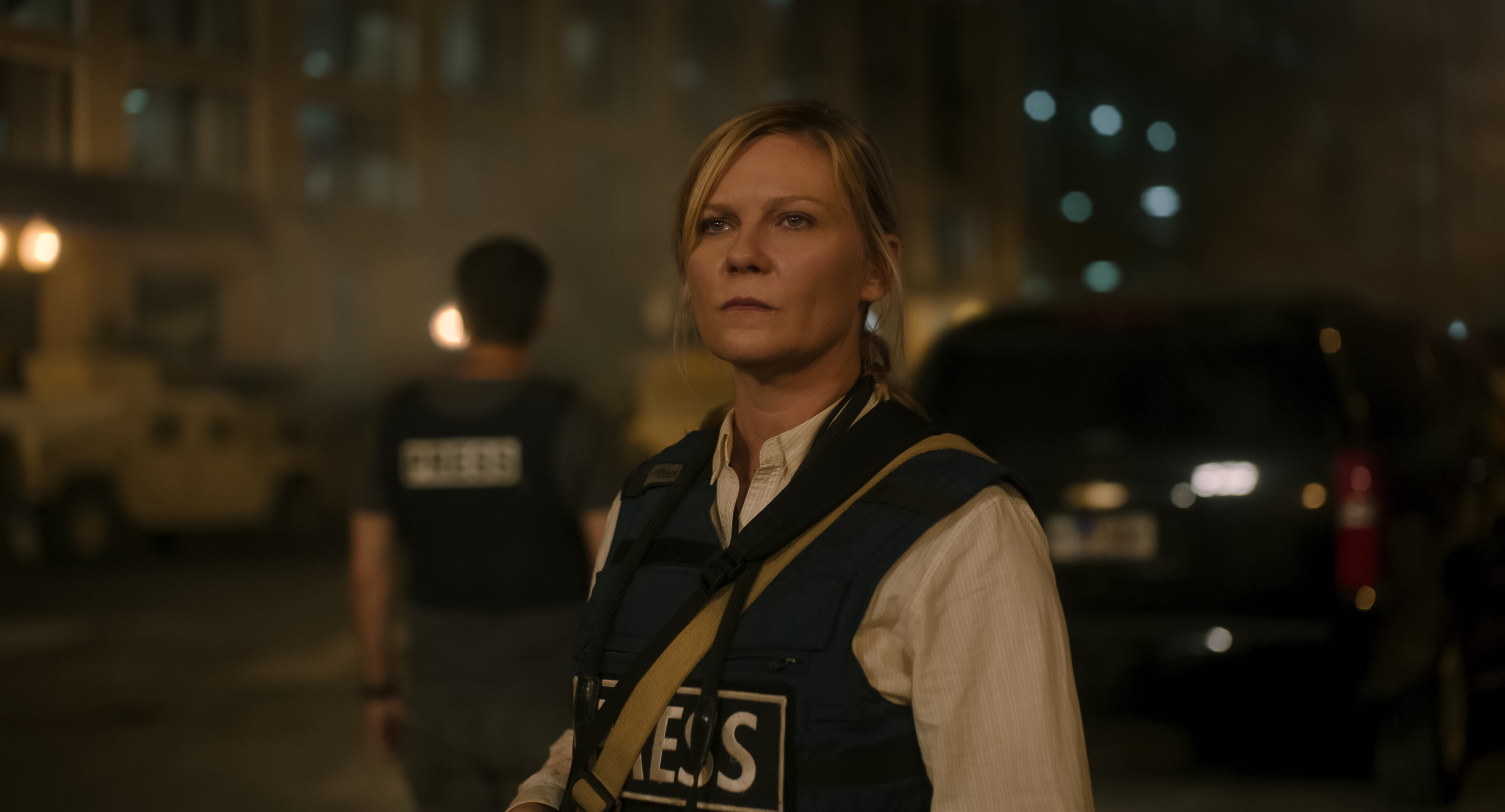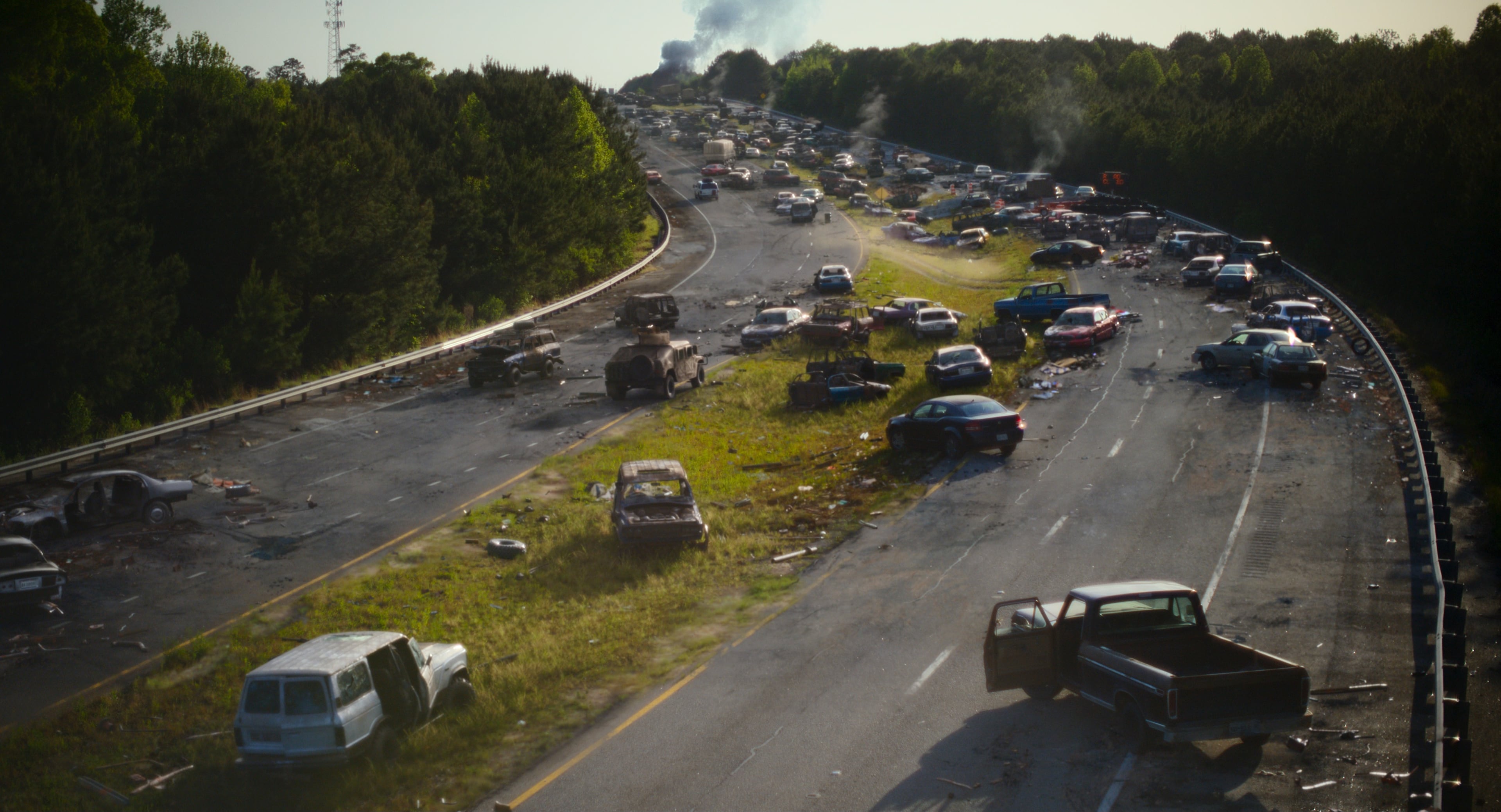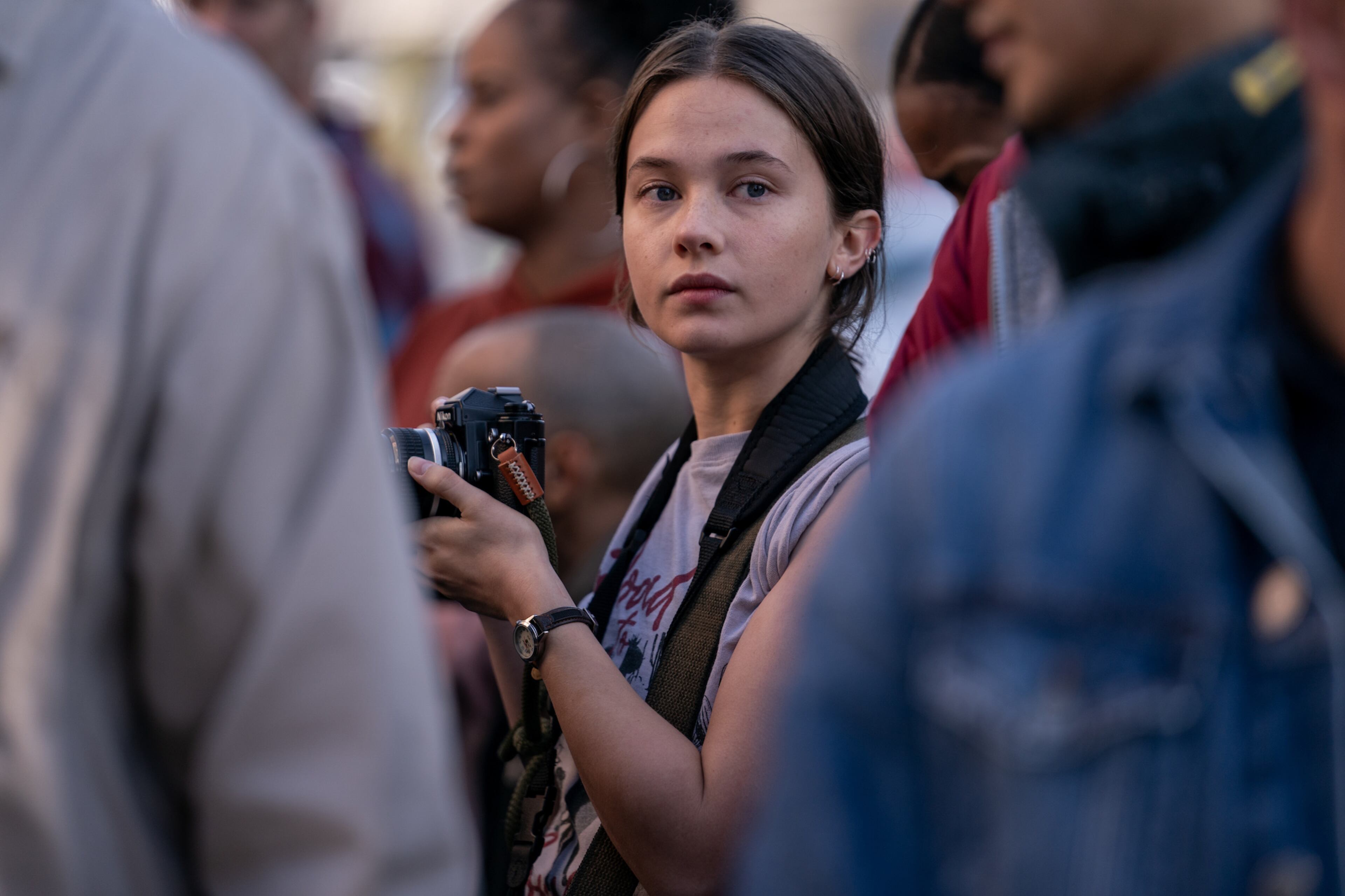Atlanta-shot ‘Civil War’ thriller not a red state vs. blue state tract

A movie about a contemporary American civil war shot in a city that was a key battleground in a real Civil War, director Alex Garland’s dystopian action film is the much anticipated, hotly debated (presumably) fictionalized account of our current red state/blue state, Trump-versus-Biden divide. In other words, an America at war with itself.
Out in theaters this weekend, “Civil War” imagines a modern conflict unfolding on the streets of New York, in Washington, D.C., and along the abandoned car-riddled highways of America. The central battle is between a Western Forces alliance of California and Texas and a third-term president (Nick Offerman) who has disbanded the FBI and launched a ground and air assault on the rebels. With its $50 million budget, “Civil War” is art house distributor A24′s most expensive film to date, a big-budget disaster film with a notably indie sensibility.

The premise of “Civil War” in terms of plot is simple: A team of journalists — numb war photographer Lee (Kirsten Dunst), hard-drinking reporter Joel (Wagner Moura), older scribe Sammy (Stephen McKinley Henderson) and an aspiring Gen Z photojournalist Jessie (Cailee Spaeny) — set out in an SUV marked “Press” from New York to Washington to interview the rogue president who has declared war on his own people. On a Cormac McCarthy-worthy road trip, the quartet enter a series of scenes that convey the depravity of a country divided by war, including a small town that has decided to ignore the conflict altogether and an eerie Christmas village in the middle of nowhere held hostage by an unseen sniper. Along the way, Lee schools protégé Jessie on how to tamp down fear and horror and get your shot.
A host of Atlanta locations were central to the film’s action in New York City, Washington and the American heartland, including the sadly derelict, graffiti-covered Alonzo Herndon Stadium (once part of Morris Brown College); Big Bethel AME Church, the site of an urban skirmish between civilians and the military; and a replica of the White House housed at Tyler Perry’s studio at the former Fort McPherson site.
The “Civil War” shoot marked a return to Atlanta for Offerman who, from past visits, already knew his way around a Varsity chili dog, The actor had performed at Atlanta Symphony Hall and the Tabernacle, signed his book “Good Clean Fun” at A Cappella bookstore and posted Instagram footage of perhaps his favorite local spot, the whittlers paradise of Highland Woodworking.
Offerman said he jumped at the chance to play Garland’s cipher of a president. “When he sent me the script, it was immediately apparent that it’s another delicious creation from his imagination.
“This is like a novel about a fictional America,” he added, “and you could really substitute many other countries for it.”

Offerman has often played gruff manly men, such as deadpan Libertarian Ron Swanson in the beloved NBC comedy “Parks and Recreation” and has a side hustle as a passionate woodworker. And just as Garland’s film plumbs an American civil war’s gray areas, Offerman has also contended in his personal life with an American propensity to see issues in black and white. Though his quiet, brooding daddy aura and deftness with a hand plane suggest a cornfed uber-dude, Offerman points out that his Illinois childhood was marked by stereotypical manly pursuits such as building and fixing but also sewing and baking.
Prior to “Civil War’s” opening, the film was a source of wildfire speculation and some amount of anticipatory anger. Some conservatives attacked the film as Hollywood “woke” fearmongering about our factionalized country. Meanwhile, armchair apocalypse types just wondered how in the world British director Alex Garland thought that California and Texas would ever form an alliance. Debate over the film prior to its opening raged like its own keyboard civil war.
Those early prognosticators will certainly be disappointed by the more gray area Garland explores in his film. “Some journalists are even mad about it,” noted Offerman in a Zoom interview, about Garland’s lack of explicitly drawn political lines in the film. “Like, ‘How could you make a movie about a civil war, and not add to the conversation that my day is filled with? I was all ready to weigh in on this one way or another. And you’ve just given me this thoughtful novel of a movie where I’m supposed to consider something more thoughtful and open-minded?’”

“Civil War” is far from the MAGA-versus-Antifa powder-keg tract some were predicting. It’s more a story about the complexities of embedded journalism and how war reporters maintain their humanity while documenting perverse degrees of inhumanity. Garland’s father was a newspaper cartoonist, and “Civil War” is a film where the only visible heroes are the journalists. It’s at this level that “Civil War” is most effective, especially in honing in on Lee’s existential fatigue at witnessing conflict around the world and now on her own home soil. In many ways, the film feels like an ode to journalism as America’s best defense against fascism.
In other ways, “Civil War” is just how you’d expect a civil war in contemporary America would look like, with dudes in Hawaiian shirts and Dockers engaged in urban warfare and a crashed helicopter in a JCPenney parking lot. At tent villages for the displaced, perky citizens make paper chain crafts, hula hoop and, in true resilient American fashion, just try to make the best of their post-apocalyptic digs.
Less effective is how Garland fails to offer any backstory about how and why battle lines are drawn. The film moves with the strange daisy chain stops and starts of a video game, with the press van moving from one creepy set piece to the next, and also makes use of some war and zombie film chestnuts. A woman scrambling out of a burial pit of corpses, a soundtrack blasting hip hop and country tunes that nods to the pop-music infused “Apocalypse Now,” and an episodic pace that feels like the HBO series “The Last of Us” . . . all detract from Garland’s more interesting philosophical noodling.
IF YOU GO
“Civil War”
Starring Kirsten Dunst, Wagner Moura and Cailee Spaeny. Directed by Alex Garland.
Rated R for strong violent content, bloody/disturbing images and language throughout. Check listings for theaters. 1 hour, 49 minutes.

